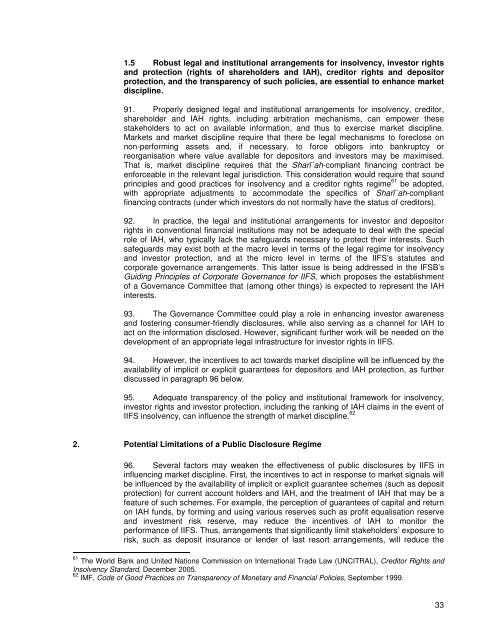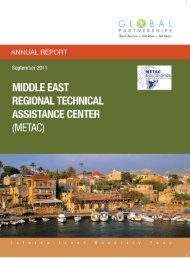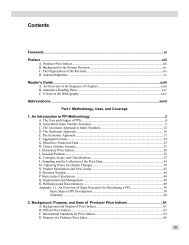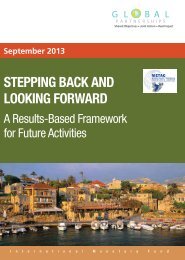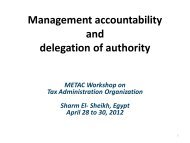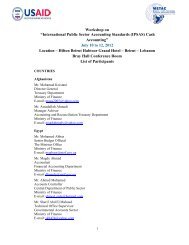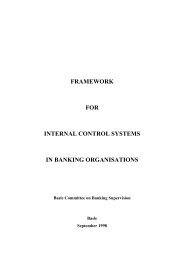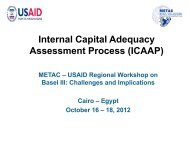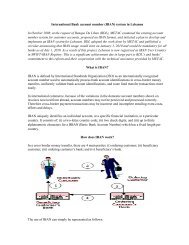Disclosures to Promote Transparency and Market - IFSB
Disclosures to Promote Transparency and Market - IFSB
Disclosures to Promote Transparency and Market - IFSB
You also want an ePaper? Increase the reach of your titles
YUMPU automatically turns print PDFs into web optimized ePapers that Google loves.
1.5 Robust legal <strong>and</strong> institutional arrangements for insolvency, inves<strong>to</strong>r rights<br />
<strong>and</strong> protection (rights of shareholders <strong>and</strong> IAH), credi<strong>to</strong>r rights <strong>and</strong> deposi<strong>to</strong>r<br />
protection, <strong>and</strong> the transparency of such policies, are essential <strong>to</strong> enhance market<br />
discipline.<br />
91. Properly designed legal <strong>and</strong> institutional arrangements for insolvency, credi<strong>to</strong>r,<br />
shareholder <strong>and</strong> IAH rights, including arbitration mechanisms, can empower these<br />
stakeholders <strong>to</strong> act on available information, <strong>and</strong> thus <strong>to</strong> exercise market discipline.<br />
<strong>Market</strong>s <strong>and</strong> market discipline require that there be legal mechanisms <strong>to</strong> foreclose on<br />
non-performing assets <strong>and</strong>, if necessary, <strong>to</strong> force obligors in<strong>to</strong> bankruptcy or<br />
reorganisation where value available for deposi<strong>to</strong>rs <strong>and</strong> inves<strong>to</strong>rs may be maximised.<br />
That is, market discipline requires that the Sharī`ah-compliant financing contract be<br />
enforceable in the relevant legal jurisdiction. This consideration would require that sound<br />
principles <strong>and</strong> good practices for insolvency <strong>and</strong> a credi<strong>to</strong>r rights regime 61 be adopted,<br />
with appropriate adjustments <strong>to</strong> accommodate the specifics of Sharī`ah-compliant<br />
financing contracts (under which inves<strong>to</strong>rs do not normally have the status of credi<strong>to</strong>rs).<br />
92. In practice, the legal <strong>and</strong> institutional arrangements for inves<strong>to</strong>r <strong>and</strong> deposi<strong>to</strong>r<br />
rights in conventional financial institutions may not be adequate <strong>to</strong> deal with the special<br />
role of IAH, who typically lack the safeguards necessary <strong>to</strong> protect their interests. Such<br />
safeguards may exist both at the macro level in terms of the legal regime for insolvency<br />
<strong>and</strong> inves<strong>to</strong>r protection, <strong>and</strong> at the micro level in terms of the IIFS’s statutes <strong>and</strong><br />
corporate governance arrangements. This latter issue is being addressed in the <strong>IFSB</strong>’s<br />
Guiding Principles of Corporate Governance for IIFS, which proposes the establishment<br />
of a Governance Committee that (among other things) is expected <strong>to</strong> represent the IAH<br />
interests.<br />
93. The Governance Committee could play a role in enhancing inves<strong>to</strong>r awareness<br />
<strong>and</strong> fostering consumer-friendly disclosures, while also serving as a channel for IAH <strong>to</strong><br />
act on the information disclosed. However, significant further work will be needed on the<br />
development of an appropriate legal infrastructure for inves<strong>to</strong>r rights in IIFS.<br />
94. However, the incentives <strong>to</strong> act <strong>to</strong>wards market discipline will be influenced by the<br />
availability of implicit or explicit guarantees for deposi<strong>to</strong>rs <strong>and</strong> IAH protection, as further<br />
discussed in paragraph 96 below.<br />
95. Adequate transparency of the policy <strong>and</strong> institutional framework for insolvency,<br />
inves<strong>to</strong>r rights <strong>and</strong> inves<strong>to</strong>r protection, including the ranking of IAH claims in the event of<br />
IIFS insolvency, can influence the strength of market discipline. 62<br />
2. Potential Limitations of a Public Disclosure Regime<br />
96. Several fac<strong>to</strong>rs may weaken the effectiveness of public disclosures by IIFS in<br />
influencing market discipline. First, the incentives <strong>to</strong> act in response <strong>to</strong> market signals will<br />
be influenced by the availability of implicit or explicit guarantee schemes (such as deposit<br />
protection) for current account holders <strong>and</strong> IAH, <strong>and</strong> the treatment of IAH that may be a<br />
feature of such schemes. For example, the perception of guarantees of capital <strong>and</strong> return<br />
on IAH funds, by forming <strong>and</strong> using various reserves such as profit equalisation reserve<br />
<strong>and</strong> investment risk reserve, may reduce the incentives of IAH <strong>to</strong> moni<strong>to</strong>r the<br />
performance of IIFS. Thus, arrangements that significantly limit stakeholders’ exposure <strong>to</strong><br />
risk, such as deposit insurance or lender of last resort arrangements, will reduce the<br />
61 The World Bank <strong>and</strong> United Nations Commission on International Trade Law (UNCITRAL), Credi<strong>to</strong>r Rights <strong>and</strong><br />
Insolvency St<strong>and</strong>ard, December 2005.<br />
62 IMF, Code of Good Practices on <strong>Transparency</strong> of Monetary <strong>and</strong> Financial Policies, September 1999.<br />
33


